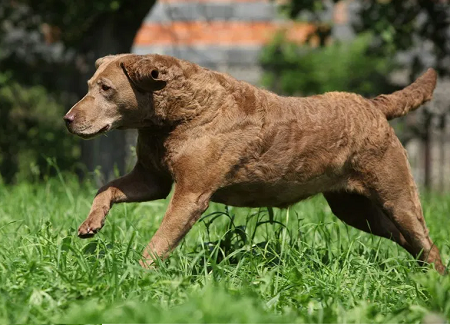Chesapeake Bay Retriever Dog Training
The purely American breed Chesapeake Bay Retriever also known as the “most rugged retriever” is a courageous, powerful, and water-loving dog breed. They tend to be more sensitive, bright, and affectionate with their master and other family members if socialized properly. Their emotion differs more than other usual gundogs as they are very emotional.
Chessies are high-energy breeds that need an excess amount of activity and daily exercise in order to keep them busy. Even if they have no jobs to fulfill, Chessies always find a job for themselves like digging and chewing on unnecessary things, barking, and hunting on their own. So, to avoid these things, they need proper training as they can be excellent watchdogs and versatile athletes if trained properly.
When to start training Chesapeake Bay Retriever?
Chesapeake Bay training should start the day you bring your puppy home. Obedience training is a must for them at young age which helps them to socialize well with the surroundings. You can start with the commands like “sit”, “down”, “stay”, and so on.
Chessies is a willful and a quick learner that gains benefit and retains through obedience training. You can continue the obedience training for around 8 to 10 weeks after he dewormed and had his first series of vaccinations.

Image Source: American Kennel Club
As you complete its first stage or obedience training, you can start their advanced training. Their training should be fun without repetition so they don’t get bored easily. They require plenty of activity as you can take them on daily long walks, give them the opportunity to swim that satisfy their exercise and fun.
These breeds are also well-known for their hunting ability where you can assign a hunt test as well as engaging in field trials competition, sports like rally, flyball, and agility training. At your training session ends, praise or reward him for something he is good at.
Where to start training Chesapeake Bay Retriever?
Chessies’ training should start at their early puppy stage. The training can be done inside the house where they get basic obedience as well as potty training. They need more exercise so the advanced training should be done outdoors on the lawn or even in the park.
How to define the task for Chesapeake Bay Retriever?
Chessies are considered stubborn and difficult to train, while several trainers think they need more physical discipline and plenty of exercise. However, they can be stubborn at some time but training your puppy won’t be a struggle.
Chesapeake are intelligent and quick learner: you can assign define task by using different simple words alongside with hand gesture. Likewise, showing a demonstration to define a task is more understandable to them. This breed ought to learn many things from people around them, so don’t take an easy route by sending him to a trainer.

Image Source: Animal Heed
Training Process
As mentioned above, training Chessies is not a difficult task until you are calm, gentle, and consistent with them. They love their playing time, so training a Chesapeake Bay Retriever is fun all the time.
Basics
Basic obedience training is very important for Chessies while they still growing up. At their puppy phase they respond well more than the adult ones. The positive reinforcement and food rewards are one of the best strategies that can be used in basic training. Doing this will make Chessies’s basic training more fun, interesting, and a success.
Sporting Dog Training
Chessies are very fond of exercise as a minimum of 20 min of playtime per day can keep them busy. A repetitive routine of playtime is a no for CHessies, instead you can engage them with creative training.
As we all know, Chesapeake is a born hunter with excellent smelling power in the field. Some of their breeds can retrieve an average of 100 ducks in a single day, where you can engage them in a task of hunting to make their training session much more interesting.
Visit Doglime for more dog breed information and their training strategies.
Tags










